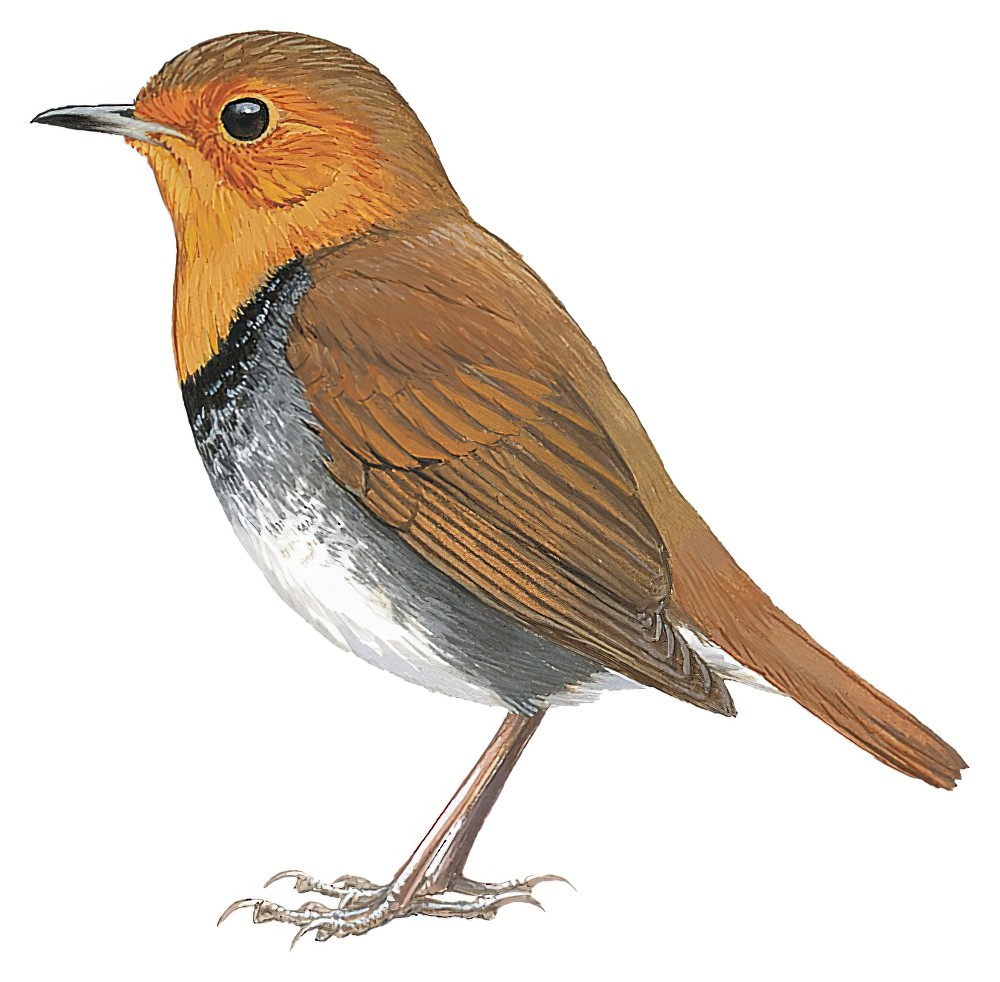Japanese Robin / Larvivora akahige

Japanese Robin
SCI Name:
Protonym: Sylvia akahige Pl.Col. livr.96 pl.571
Taxonomy: Passeriformes / Muscicapidae / Larvivora
Taxonomy Code: japrob1
Type Locality: Riu Kius, south of Japan ; corrected to Hondo by
Author: Temminck
Publish Year: 1835
IUCN Status:
DEFINITIONS
LARVIVORA
(Muscicapidae; Ϯ Siberian Blue Robin L. cyane) Mod. L. larva caterpillar, larvae < L. larva spectre, mask; L. -vorus -eating < vorare to devour; "CRATEROPODINÆ. Genus Larvivora, nobis. Bill equal to head, subcylindric, straight and slender; at base rather broader than high, and gradually narrowed; ridge considerably keeled: upper mandible rather longer than the lower, and vaguely inclined and notched. Rictal and nuchal hairs small and feeble. Wings, tail, and nares as in Turdus, but the two former somewhat less developed. Tarsi elevate, slender, nearly smooth: toes, all of them, compressed; lateral fores and hind sub-equal; exterior fore connected to the first joint. Nails, moderately arched and rather acute. 1st Species. L. Cyana; blue Larvivora, nobis. ... 2nd Species. L. Brunnea; brown Larvivora, nobis. ... These birds differ conspicuously from Tesia (SWAINSON'S Aipunemia?) by stronger wings and tail, by their less cylindric and less entire bill, and by their open meruline nares. They have much of the aspect of the Sylviadæ, but are essentially terrestrial. Do they not constitute the oriental type of the American Drymophilæ? and do they not serve, in a remarkable manner, to connect the Merulinæ and the Crateropodinæ? ... From the number of insect nests and larvæ found in their stomachs, I have called the genus Larvivora." (Hodgson 1837).
Var. Lavivora.
Synon. Icoturus, Pseudaedon.
larvivora / larvivorus
Mod. L. larva caterpillar, larvae < L. larva spectre, mask; L. -vorus -eating < vorare to devour.
akahige
Japanese name Akahige red beard < aka red; hige beard, for the Ryukyu Robin Larvivora komadori, erroneously given to the Japanese Robin by Temminck, who believed it came from the Ryukyus. The appellation appears even more confusing when it is revealed that the Ryukyu Robin has a black, not red, throat and breast! However, Hiraoka Takashi in litt., advises that although the traditional name Akahige has been retained for more than two centuries, it is generally considered to be an original error for Akaike red hair < akai red; ke hair (Larvivora).
SUBSPECIES
Japanese Robin (Japanese)
SCI Name: Larvivora akahige akahige/rishirensis
LARVIVORA
(Muscicapidae; Ϯ Siberian Blue Robin L. cyane) Mod. L. larva caterpillar, larvae < L. larva spectre, mask; L. -vorus -eating < vorare to devour; "CRATEROPODINÆ. Genus Larvivora, nobis. Bill equal to head, subcylindric, straight and slender; at base rather broader than high, and gradually narrowed; ridge considerably keeled: upper mandible rather longer than the lower, and vaguely inclined and notched. Rictal and nuchal hairs small and feeble. Wings, tail, and nares as in Turdus, but the two former somewhat less developed. Tarsi elevate, slender, nearly smooth: toes, all of them, compressed; lateral fores and hind sub-equal; exterior fore connected to the first joint. Nails, moderately arched and rather acute. 1st Species. L. Cyana; blue Larvivora, nobis. ... 2nd Species. L. Brunnea; brown Larvivora, nobis. ... These birds differ conspicuously from Tesia (SWAINSON'S Aipunemia?) by stronger wings and tail, by their less cylindric and less entire bill, and by their open meruline nares. They have much of the aspect of the Sylviadæ, but are essentially terrestrial. Do they not constitute the oriental type of the American Drymophilæ? and do they not serve, in a remarkable manner, to connect the Merulinæ and the Crateropodinæ? ... From the number of insect nests and larvæ found in their stomachs, I have called the genus Larvivora." (Hodgson 1837).
Var. Lavivora.
Synon. Icoturus, Pseudaedon.
Japanese Robin (Izu)
SCI Name: Larvivora akahige tanensis
tanensis
Tanega’ / Tanegashima I., Japan.
UPPERCASE: current genus
Uppercase first letter: generic synonym
● and ● See: generic homonyms
lowercase: species and subspecies
●: early names, variants, mispellings
‡: extinct
†: type species
Gr.: ancient Greek
L.: Latin
<: derived from
syn: synonym of
/: separates historical and modern geographic names
ex: based on
TL: type locality
OD: original diagnosis (genus) or original description (species)












